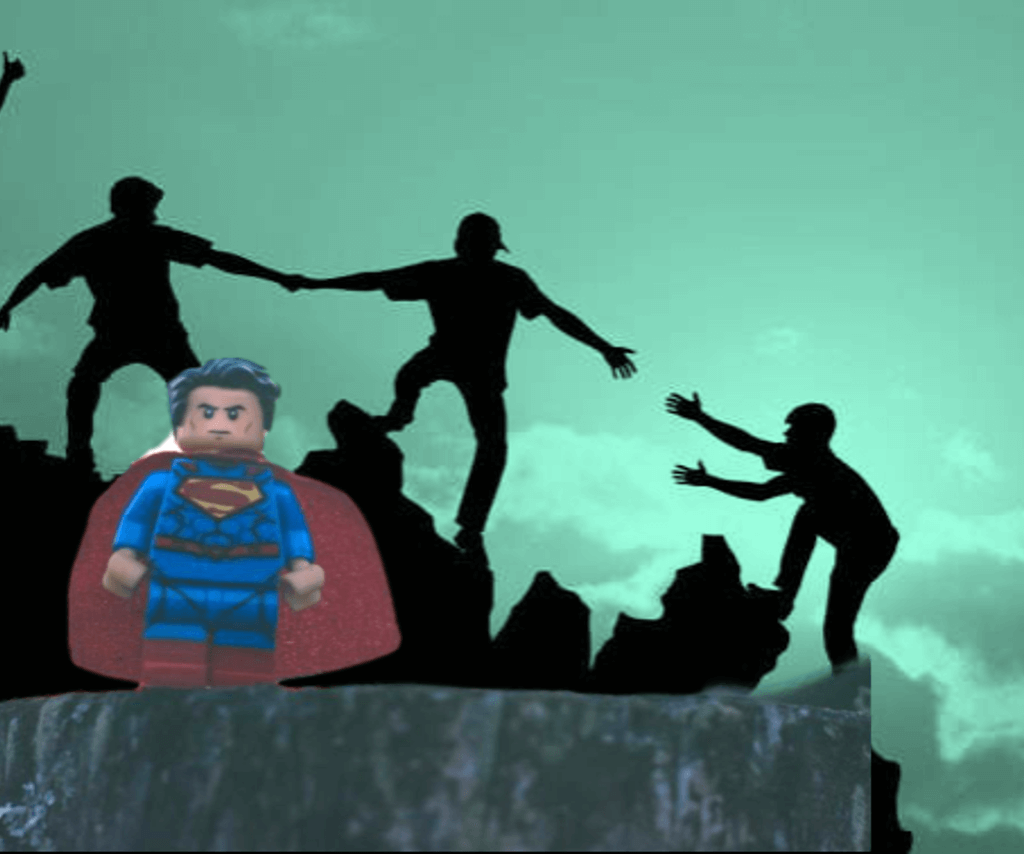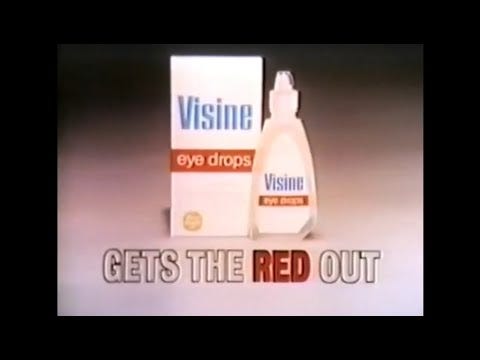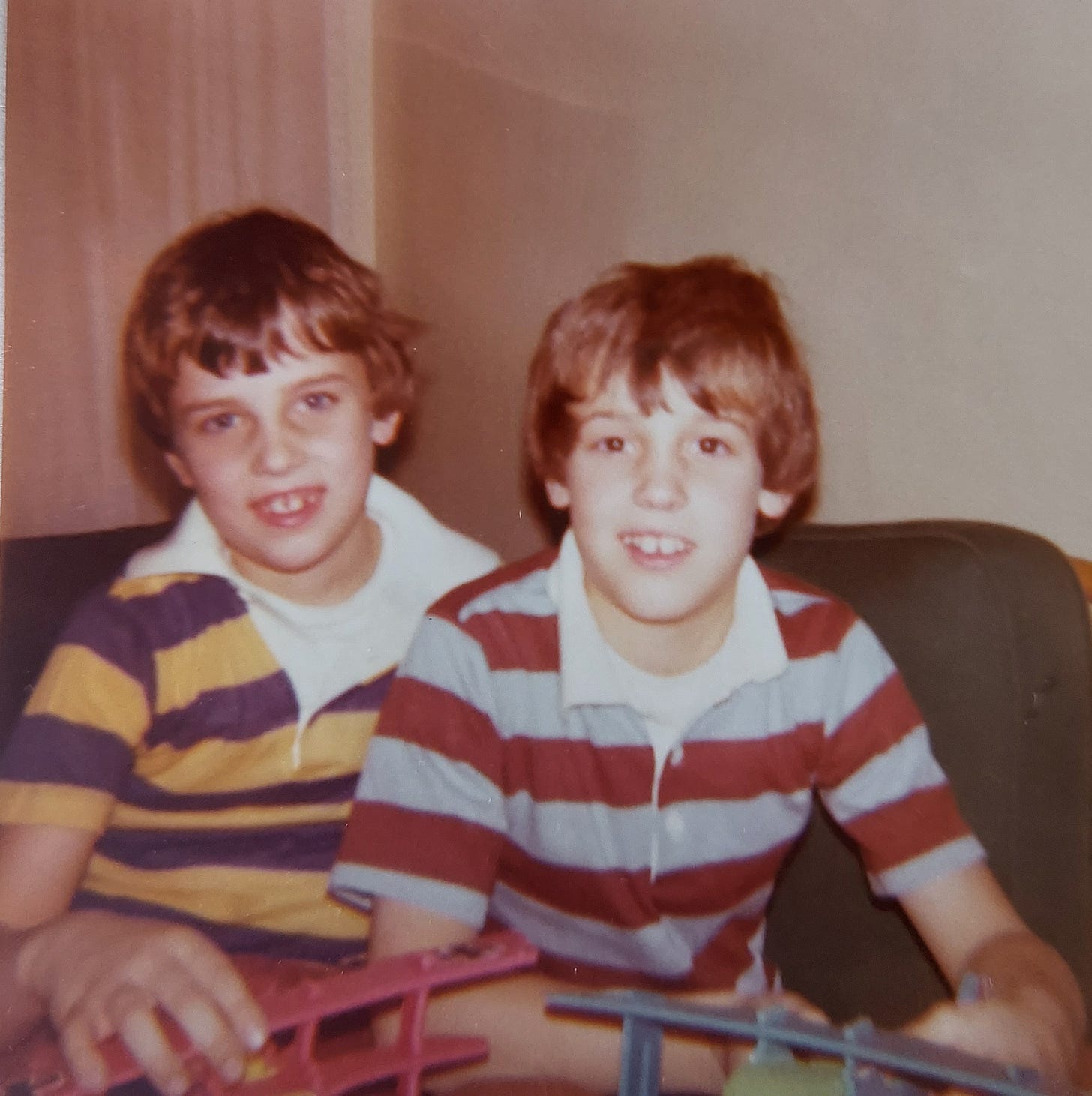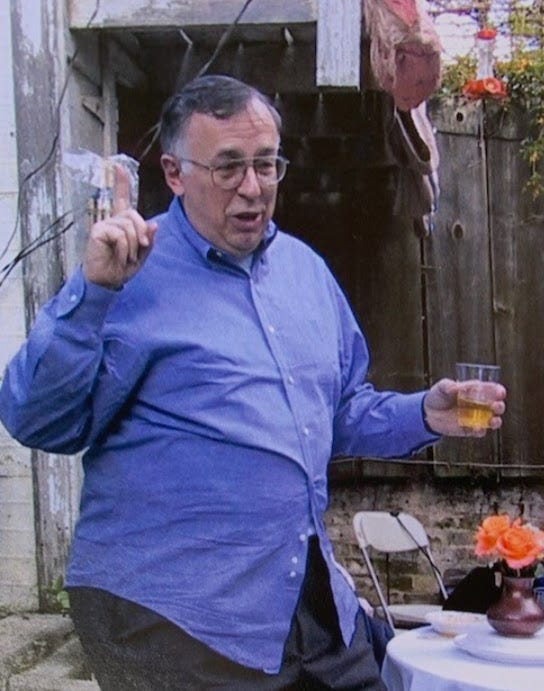From Men of Steel to Men of Teal
The deeper debate about work-from-home; My father brought the terror and the joy; How we can become "Men of Teal"
Happy New Year!
This edition of FrauenTimes covers my fave topics—masculinity, work and consciousness—through three lenses.
First is the current debate about working from home. When Donald Trump and his advisors say they want to bring federal employees back to the office, they’re revealing an outdated mindset of cynicism, fear and paternalism.
Second is the impact my father had on me as a kid. I share a excerpt of my upcoming book. My dad could be so much fun. But because of a confined version of manhood, he also had a Mr. Hyde side that scared and scarred me. (FYI: excerpt is 1,900 words.)
Third is a video about how men can go from trying to be the “Man of Steel” to becoming “Men of Teal.” I explain how men can embrace a “Teal” consciousness, including emotional authenticity, a preference for collaboration and deep trust.
Enjoy!
***
The Remote Work Debate Can Take Us to Better Places
(This piece is derived from a January 6, 2025, Op-Ed in The Atlanta Journal-Constitution that I cowrote with Robert Rasmussen.)
The future of “work from home” is a hot topic today–and one with the potential to transform our companies and our consciousness.
President-elect Donald Trump wants to end work from home arrangements (WFH) for federal employees. So do his advisors, Elon Musk and Vivek Ramaswamy.
Trump, Musk and Ramaswamy, along with many business leaders, claim to want workers in the office for greater efficiency. But the evidence is against them, and there are deeper issues at play.
Fundamental beliefs about trust and human nature shape the debate. Cynicism about people and their ability to be good stewards of their freedoms underpin the anti-WFH arguments. In fact, the conversation around WFH is a great opportunity to shift our thinking as leaders and as a society. Remote work policies are a prompt for us to shed mindsets of fear and scarcity in favor of a credo of faith and abundance.
Such a positive mindset shift is empowering the next generation of business cultures, as described in Frederic Laloux’s 2014 book, Reinventing Organizations. Laloux, a former McKinsey & Co. associate partner, developed the concept of “Teal” organizations to describe how we are evolving as a species toward a higher consciousness and corresponding way of working.
Teal organizations:
--Prioritize self-management, trusting people to make decisions with high levels of autonomy;
--Embrace wholeness, including our need for personal development and emotional and spiritual well-being;
--Operate with “evolutionary purpose,” treating the organization as a living organism with a calling that might change over time.
Our very survival as a species depends on more of us moving to a Teal mindset. A consciousness where we see ourselves as one large human family, we rein in the damage unchecked capitalism is doing to our fragile climate and we meet everyone’s basic needs so we can pursue our highest purposes.
That’s why this WFH discussion is promising. Widespread freedom to work remotely during COVID led people to realize we could better integrate work and the rest of life.
The conversation about WFH can help us get to better places —- no matter where we end up working.
(The full Op-Ed is behind a paywall--consider subscribing to the AJC!)
***
The Terror and the Joy
Book excerpt on the way a confined version of masculinity shaped my dad’s impact on me
When I was a boy, my father brought the terror.
One of my earliest memories–maybe my very earliest–is of watching my father try to put eye drops in his eye. I must have been three or so. My father lay on his back on the carpet in our living room. He kept squeezing drops of Visine toward his eye. But he would blink before it arrived, Visine splashing on his eyelid instead. He grew more and more frustrated. He grunted–a sound like an elephant trumpeting. Starting with a low pitch and wailing upwards.
Suddenly he whipped the little Visine bottle across the room. It smashed into our stereo cabinet. A brown, low-slung box with three sliding doors, holding vinyl records. I remember the decorative grooves of those thin wooden doors.
Maybe that cabinet stays etched in my memory because of how scared I was by the Visine bottle incident. I felt terrified. My dad hadn’t hurt me. His anger had nothing to do with me. But I remember my senses going on high alert. I wasn’t entirely safe with this person.
When I was a boy, my father also brought the joy.
He would stand on his knees in that same living room, holding his arms like a cactus. And we would climb him. My brother and I and our two closest friends would treat him like a tree, pulling ourselves up to stand on a shoulder. My dad also had this trick where he would swing us up to that same shoulder perch.
He had us flying. So fun.
We’d wrestle–the four of us boys against the man. He was tough yet careful. Absorbing our tackle attempts and tossing us gently to the side. We’d roll over and return for another thrilling assault.
***
When I was a boy, my father continued to blend the horror and the happiness. The two experiences from him alternating like Dr. Jekyll and Mr. Hyde. Hard to know who would show up. And Hyde proved quite willing to menace people, along with furniture. My dad didn’t abuse me physically. I think he hit me just once or twice, light swats rather than serious blows. But he didn't need to strike me to strike fear into my soul.
Once, when I was 12 or so, I called my younger brother a name that meant “stupid” in our Buffalo suburb. The word, ”BOCES,” stood for the Boards of Cooperative Educational Services. Kids who used the BOCES program got vocational education, like auto technician training. To our minds, back then, “BOCES” signaled you didn’t have the smarts to go to college.
It was a cruel and unfair label. To this day, I regret using it on my brother, who had an undiagnosed learning disability and struggled in school. “BOCES” didn’t even fit the particular situation when I wielded the word. My brother, 10, and I were assembling Sunday morning newspapers for my paper route. And I grew frustrated that he moved so slowly. That had to do with his sleepiness rather than any academic shortcomings.
In any event, when my dad heard I’d called my brother a BOCES, he pinned me against the wall. In our hallway just in from the side door. Pale yellow paint on the wall. Sneakers and boots at our feet. My dad was a big, strong man, six feet tall and roughly 200 pounds. I was a skinny pre-pubescent kid. Powerless in his grip.
I was petrified.
My dad screwed up his face, bared his teeth and bit his tongue. “If you ever use that term again, you will be kicked out of this house!” he hissed.
Only later did I reflect on the impact of those words. Not only had he frightened me physically, but he’d threatened me on an existential level–just as I was beginning to peer into the adult world.
I understand my dad's anger. He was protecting his younger son from emotional harm. A papa bear. And yet his method did damage to his older son. Cultivated or exacerbated anxiety that has plagued me throughout my life.
How different might my childhood have been, how much less fragile might my psyche be today, if my dad had mastered his anger. If on that particular Sunday morning, for example, he'd quietly sat me down and talked with me about the term BOCES. If he'd asked why I said it. Asked if I knew how it could affect my brother.
***
But that's not who he was, at least not yet.
He hadn't challenged received wisdom on how to parent. Hadn't reflected on the impact of unchecked anger. Hadn't taken a hard look at Mr. Hyde in the mirror.
And so my dad’s Mr. Hyde would carry out these campaigns of fear–against the whole family. Berating my mother for a disorderly house. Browbeating my younger brother and sister for not working hard enough to clean it.
It wasn’t just scary. It was infuriating. Even as I feared him, I felt rage at the injustice of his temper tantrums. My mom didn’t deserve the mistreatment. None of us did. I didn’t resist him when I was young, though. And that made things worse–I felt shame for not standing up to him.
But the Dr. Jekyll version of my dad also was very present. And not just kindly and respected, as a technology-savvy entrepreneur. He also was a bon vivant. My dad organized ski trips with other families. He stepped in to coach my baseball team when our initial coach flaked. He created a gathering titled the “BBB”--Basketball, Breakfast and Bloody Marys.
That annual event brought 20 or so families to our house, where the men played a three-on-three basketball tournament in our driveway, my dad cooked up scrambled eggs served with “glop”--his name for a tomato, peppers and onions sauce–and the adults got tipsy on morning cocktails. It was such a hit that my middle school pals still remember the BBBs fondly.
At my dad’s memorial service last year, I learned he’d earned the award for “congeniality” in eighth grade. This, even though he’d only been at the K-8 school for three years. Truly, he could connect with just about anyone. And enjoyed doing so.
***
When I was a boy, my dad’s mood mostly had to do with how his work was going. My father benefitted from an unconventional and privileged start in business. In college, he helped his father negotiate malt deals with titans of the beer industry. And after my grandfather sold the family’s malting business, my dad inherited a trucking company.
With that business as a foundation, my dad ventured out into an area that intrigued him: video technology. He designed and developed some of the first video technology systems in the 1970s. He managed the Buffalo Bills football stadium scoreboard–one of the first in the world to show instant replays. He also installed camera systems in prison facilities and nuclear power plant buildings
But bad luck hit him in the form of the Three Mile Island nuclear plant accident. Public skepticism effectively shut down nuclear power nationwide. And eventually my dad had to close his company, Frauenheim Process.
When he felt jazzed by his projects and cutting-edge systems, my dad soared. Dr. Jekyll was in the house. Playfulness and high spirits. Adventures like arranging a ski trip to Banff in Canadian Rockies.
But when customers failed to pay him or his efforts in nuclear power proved fruitless, watch out. Mr. Hyde roared home into the driveway. Anything could set him off. It was no use trying to tidy up the house or please him. He’d find a reason to put on that frightening face, lips pulled back, looking like he would bite off the tip of his tongue.
***
I suspect masculinity matters had much to do with my dad’s shadow side. Those dark moods and mean streaks seemed to surface when he felt himself failing to live up to traditional, cramped notions of how men are supposed to show up. As providers, protectors, conquerors. As strong, self-made and stoic.
My dad’s Mr. Hyde reared up when he thought he’d let us down as a bread-winner and an achiever. And when he thought he let himself down. As much as he enjoyed being with people, he also believed men were supposed to best people. To be better than others.
My dad often bragged about setting swimming records as a youth, about settling fights as a kid by scaring the other combatants into submission. About learning judo in the army and being unafraid to walk through any neighborhood in New York City.
He had many great ideas, but he also saw himself as the smartest guy in the room. We now know how important humility and emotional intelligence matter to success. My dad’s haughtiness probably hindered his business progress.
Arrogance and irritability became more pronounced in my dad as his company teetered on collapse in the late 1970s. Around the time he lit into me for the BOCES comment.
Also around this time, I saw my dad’s veneer of self-confidence crack open.
Or rather, I heard it.
***
My brother, sister and I crouched on the upstairs landing of our staircase one night, and listened to my father bawl in the family room downstairs.
He had decided to shutter Frauenheim Process. And he was processing the grief in a way I’d never experienced from him. Not publicly. Not consciously in front of his children–we couldn’t see him from our hiding place. But with my mother.
I imagine her holding him tightly as he sobbed loudly.
Later on, in his 60s, 70s, my dad grew more comfortable shedding tears. He grew kinder and gentler.
But that evening, that evening of weeping about broken dreams and perhaps humiliation, was a rare occasion of him expressing vulnerability when I was a boy.
Anger and ebullience were the main currency of my father’s emotional life then. He possessed an impoverished vocabulary of feelings. A limited language that constrained so many men of his generation.
A confined masculinity that shaped everyday actions and reactions. Like his attempt to put eyedrops into itchy eyes.
***
I wonder if deep assumptions about manliness caused him to see red in that moment. I suspect he felt the sting of failure in not getting the Visine into his eye. And failure loomed large for my dad. He would tell me that “100 ‘attaboys’ don’t add up to one ‘oh shit, boy.’” An impossible perfectionism, a corollary to the traditional call for men to achieve, succeed and stand out to attain self-worth.
My dad applied that perfectionist standard during his house-cleaning tirades. Finding fault in nearly anything we would do to straighten up the garage or family room. But to his credit, my dad didn’t hold me to that unrealistic expectation in most arenas. I never felt him pressuring me to perform in sports or academically––in fact, he consistently told me he was proud of my grades and efforts.
But he tended to judge himself harshly. At once cocky and insecure. Could the inability to land the eyedrops have undermined his sense of self-esteem? Caused him to doubt his identity as a supremely capable man?
And might it have touched another deep nerve? Of cowardice? Because blinking as the drops fell was a bit like balking. Being afraid of something entering the eye–one of the most sensitive parts of the body. Literally blinking in the face of fear. And that’s something no man wants to admit to. Especially a man who defined himself as fearless.
Maybe my dad felt a flash of shame in the moments those drops splattered lightly on his eyelid. Such a small thing, but raising big questions about his identity. And rather than address them honestly or with a sense of humor, anger rose instead. Anger that shielded him from the pain of feeling failure, of feeling afraid.
Maybe that anger protected his ego. But it hurt my psyche. Slashed it. Created a wound that remains tender to this day.
(In every edition of FrauenTimes, I plan to include an excerpt of my forthcoming book. The book—tentatively titled F*** the Tough Guy Show—aims to share my own journey as a man and the bigger story of a hopeful masculinity quietly emerging in this moment.)
***
How We Can Become Men of Teal
For a long time, many men in leadership positions have tried to be like Superman. We've been drawn to qualities of his that are pretty cool. The Man of Steel is strong, confident, virtually invincible, and able to save the day all by himself. But in the flatter, faster, fairness-focused world that's taking shape today, we need a new model for how men lead in organizations; one that moves from trying to be the Man of Steel to becoming men of teal.
CLICK HERE FOR THE VIDEO (4 min.)
(Each edition of FrauenTimes includes a video with advice designed to support men at work—as part of workplaces that work for all.
Today’s video comes from AthenaOnline, a great resource for elevating leadership skills and improving workplace culture. Note that this video link becomes obsolete after 14 days (Jan. 21, 2025). After that, you’ll need an AthenaOnline subscription to access it.)
Thanks for reading FrauenTimes! See you again soon!










Thank you Ed for bringing masculine leadership to this issue. As a Mom of a 21 year old son, I am deeply grateful.
Very moving piece about your Dad. Great writing and touching. Thanks for sharing.